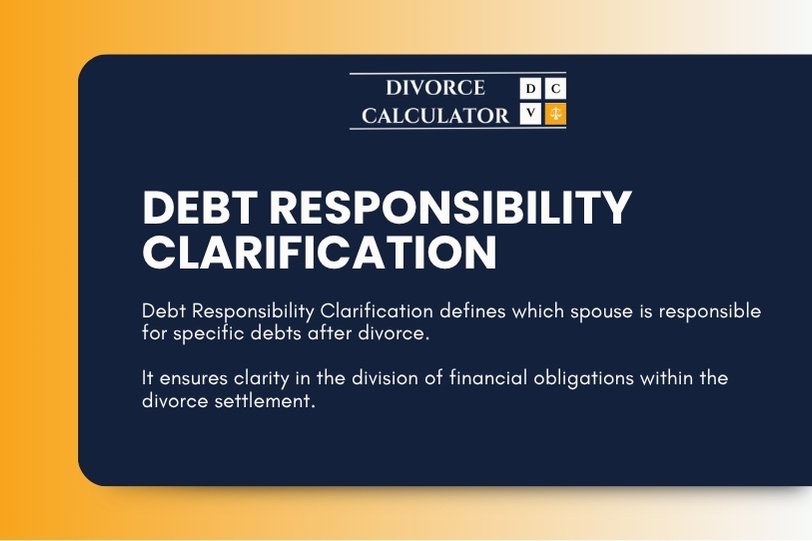When it comes to managing finances, understanding who is responsible for a debt is essential. Debt responsibility clarification means clearly identifying which individual or party is legally obligated to repay a specific debt. Knowing this can help us avoid misunderstandings or unexpected consequences down the line.
Many people find themselves unsure about whether they owe money for a joint account, co-signed loan, or after a divorce. By breaking down the facts, we can better navigate these situations and make informed decisions about our financial future.
Let’s explore how to determine debt responsibility, what common scenarios can lead to confusion, and what steps we can take to protect our credit and assets.
Key Takeaways
Debt responsibility should be clearly defined between involved parties to reduce confusion and disputes. We need to confirm who is legally and financially accountable for each obligation. This helps us prevent misunderstandings and unintentional defaults.
Key Points to Remember:
- Always review and sign written agreements related to debt.
- Clarify terms such as payment schedule, interest, and parties responsible.
- We should maintain copies of all relevant documents for our records.
| Aspect | What to Do | Why It Matters |
|---|---|---|
| Agreement Clarity | Get terms in writing | Avoids ambiguity |
| Role Assignment | Define responsibility | Prevents disputes |
| Communication | Ask questions | Ensures understanding |
| Documentation | Keep all records | Aids in future reference |
We must communicate openly with lenders or co-borrowers if our situation changes. It’s important that everyone involved knows about their responsibilities, especially in shared debts or cosigned loans.
Proper documentation and regular reviews of our debt agreements can protect us if legal questions arise. These measures help us stay informed and prepared to meet our obligations.

Why Debt Responsibility Clarification Matters In Divorce
When we go through a divorce, dividing assets is only part of the process. We also need to determine who is responsible for existing debts. This step is crucial because debt decisions have a direct impact on our financial futures.
Unclear debt responsibility can lead to:
- Collection actions against both parties
- Damage to credit scores for one or both spouses
- Ongoing disputes after the divorce is finalized
For example, if a shared credit card is not clearly assigned, both of us may remain legally liable. This can result in unexpected collections, even after we believe our divorce is settled.
| Issue | Impact |
|---|---|
| Joint loan confusion | Both are pursued for unpaid amounts |
| Missed payments | Both credit scores suffer |
| Legal disputes | Additional legal fees and stress |
The law may not automatically relieve us of liability for joint debts, even if the court order assigns them to one person. This is why clear documentation and follow-up with creditors are essential steps during divorce.
Without proper clarification, we risk financial complications that can last for years. Ensuring debt responsibility is clear protects our credit and helps us move forward independently.
Real-Life Examples
Understanding how debt responsibility plays out can be clearer with real scenarios. We often see questions about who owes what in shared living arrangements, credit cards, and co-signed loans.
Example 1: Joint Credit Card Debt
When we open a credit card account together, both parties become legally responsible for repayment. Even if one of us racks up the charges, both names on the account mean each person is liable for the full balance.
Example 2: Roommate Utility Bills
Suppose only one roommate’s name is on the utility account, but we both live there. If the bill goes unpaid, only the account holder is directly responsible. However, our informal agreement still matters for fairness, and collection agencies will seek payment from the person named on the bill.
Example 3: Co-Signing a Loan
A friend or family member co-signs an auto loan with us. If the primary borrower misses payments, the co-signer must pay. Both credit scores are at risk in this situation.
| Scenario | Who Is Responsible? |
|---|---|
| Joint Credit Card | All account holders |
| Roommate’s Utility Bill | Person on the account (informally both) |
| Co-Signed Loan | Primary borrower and co-signer |
These examples show how debt responsibility varies based on names on agreements and the type of debt. Legal documents often take priority over private arrangements among us.
How States Handle Debt Responsibility Clarification
Debt responsibility laws and procedures differ across states. Statutes, court decisions, and administrative guidance shape how residents resolve and clarify liability when faced with joint or disputed debt.
New York
In New York, debt responsibility is largely governed by both state law and case precedent. For married individuals, New York is an equitable distribution state, meaning debts incurred during marriage are divided fairly but not always equally.
We must note that co-signed debts make each party fully liable. Collection agencies require documentation before pursuing claims. Creditors are expected to provide a debt validation notice to ensure transparency.
Consumers can use Article 52 of the New York Civil Practice Law and Rules (CPLR) to contest or clarify debt ownership in court. Small claims court is commonly used for resolving minor disputes under $10,000. It’s important that debt collectors operating in New York are licensed by the Department of Financial Services.
California
California uses community property principles, so debts incurred by either spouse during marriage are typically considered joint. This rule applies unless the debt is proven to be separate, such as those taken on prior to marriage or explicitly in one name.
We should remember that clarification is often handled through detailed written agreements and court petitions. Creditors seeking debt repayment must comply with the California Rosenthal Fair Debt Collection Practices Act, which provides broader protections than federal law.
Disputes over debt responsibility are frequently addressed during divorce proceedings or probate, often requiring formal court orders. The California Department of Consumer Affairs offers resources for consumers to verify and dispute debt ownership.
Texas
Texas also adheres to community property law but has specific exemptions for certain personal debts. Spouses are generally jointly responsible for debts incurred during the marriage unless the obligation is classified as separate property.
If there is confusion about liability, we may need to examine whether the debt was for “necessaries” or shared household expenses. Texas law requires written contracts to establish joint liability if the debt is not for community benefit.
Consumers can file complaints with the Texas Office of the Consumer Credit Commissioner. Disputed debts can be litigated, and Texas courts often require explicit evidence about the origin and use of the borrowed funds.
Florida
Florida is an equitable distribution state, so marital debts are divided equitably during divorce or probate, taking into account the best interests of both parties. However, explicit co-signatures or written liability agreements are often necessary for post-divorce collection.
We should be aware that Florida’s Consumer Collection Practices Act regulates debt collection, requiring clear documentation. Debtors can send a written request for debt verification within 30 days of contact, forcing collectors to pause activity until clarification is provided.
The Florida court system provides specific forms and processes for contesting debt. In situations with unclear responsibility, parties often resolve disputes through mediation or judicial hearings, especially when property or assets are involved.
Tips If You’re Dealing With Debt Responsibility Clarification
When we face confusion about who is legally responsible for a debt, it’s important to gather all relevant documents first. We should review loan agreements, credit card applications, and any correspondence with lenders to see whose names are officially listed. This helps prevent misunderstandings and prepares us for discussions with creditors.
Next, we can contact the creditor or debt collector directly. By requesting written verification of the debt, we clarify exactly who they believe owes the balance and why. We should keep all communication in writing when possible.
It can be helpful to seek advice from a qualified financial counselor or attorney. They can review our situation and provide guidance in line with current laws and regulations. If we share a debt with someone else, open communication with that person is essential to avoid confusion and conflicts.
Checklist for debt responsibility clarification:
- Review all account documents
- Request written verification from the creditor
- Seek professional advice if necessary
- Communicate openly with co-borrowers, if any
- Keep written records of all conversations
By following these steps, we can make the process clearer and reduce the risk of mistakes. Moving step by step helps ensure we know our rights and obligations.
Frequently Asked Questions
Debt responsibility varies by situation, state law, and the nature of the debt. Understanding how marriage, divorce, and estate law affect liability can help us manage financial risk more effectively.
What is considered community debt in a divorce?
Community debt typically includes any financial obligations incurred by either spouse during the marriage. This can include credit card balances, car loans, and other debts acquired for the benefit of the household.
Each spouse may be held liable for these debts, regardless of whose name is on the account. State law often determines the precise division of responsibility.
How can one protect themselves from being responsible for a spouse’s debt?
We can take steps to protect ourselves by keeping personal accounts separate and avoiding co-signing for loans or credit used exclusively by our spouse. Establishing prenuptial or postnuptial agreements can also clarify which debts are the responsibility of each spouse.
Regularly monitoring our credit reports helps ensure we are not unknowingly added to new debts.
What are the legal implications if a spouse passes away with outstanding debt?
When a spouse dies, responsibility for their debt depends on the type of debt and state law. Debts held solely in the deceased spouse’s name may be paid from their estate before any assets are distributed.
Surviving spouses are generally not responsible for debts that are only in the deceased’s name unless they were co-signers or live in a community property state.
Upon marriage, does a spouse’s pre-existing debt become a shared responsibility?
A spouse’s pre-existing debt typically remains their separate obligation, especially if it was incurred before the marriage. However, joint accounts or co-signing can make us legally responsible for these prior debts.
Some states with community property laws may place part of the responsibility on both spouses, depending on how the debt is managed after marriage.
In Texas, how is community debt distinguished from separate debt?
In Texas, community debt covers all obligations incurred by either spouse during marriage, unless the creditor agreed to look only to one spouse’s separate property. Separate debt refers to obligations one spouse acquired before the marriage, or by gift or inheritance.
We should be aware that community debt is generally payable from both spouses’ community property.
Are debt validation letters an effective tool for disputing debt responsibility?
Yes, sending a debt validation letter is a legally recognized way to dispute and request verification of a debt. If the creditor cannot provide sufficient evidence of our responsibility for the debt, we may not have to pay it.
It’s important to act quickly, as there is often a limited window of time after initial contact with a debt collector to exercise this right.



